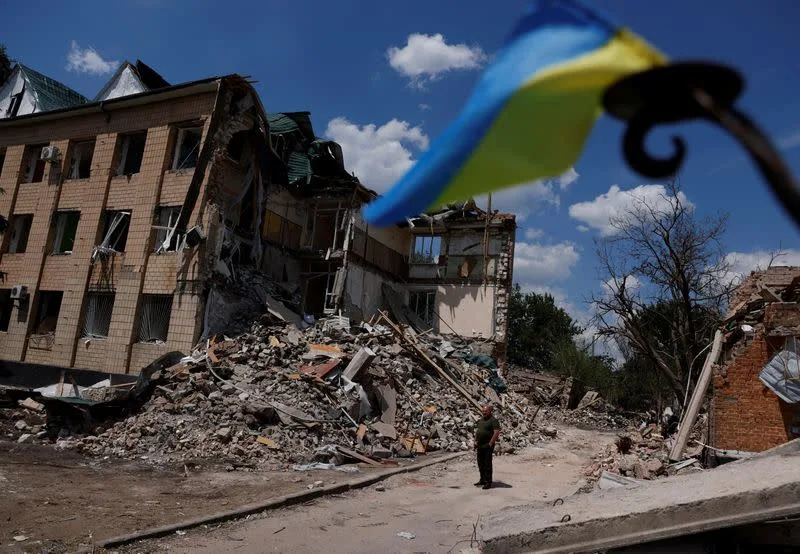Reuters
Intense fighting in Ukraine’s bombed-out Sievierodonetsk
Pavel Polityuk and Abdelaziz Boumzar – June 9, 2022



KYIV (Reuters) – Ukrainian forces were holding their positions in intense street fighting and under day and night shelling in Sievierodonetsk, officials said, as Russia pushes to control the bombed-out city, key to its objective of controlling eastern Ukraine.
Sievierodonetsk and its twin city Lysychansk, on the opposite bank of the Siverskyi Donets river, are the last Ukrainian-controlled parts of Luhansk province, which Russia is determined to seize as one of its principal war objectives.
Ukraine’s Security Council Secretary Oleksiy Danilov said on Thursday the situation in Sievierodonetsk was “extremely complicated” and Russian forces were focusing all of their might in the area.
“They don’t spare their people, they’re just sending men like cannon fodder … they are shelling our military day and night,” Danilov told Reuters in an interview.
Ukraine says its only hope to turn the tide in its favour in the small industrial city is more artillery to offset Russia’s massive firepower.
In a rare update from Sievierodonetsk, the commander of Ukraine’s Svoboda National Guard Battalion, Petro Kusyk, said Ukrainians were drawing the Russians into street fighting to neutralise their artillery advantage.
“Yesterday was successful for us – we launched a counteroffensive and in some areas we managed to push them back one or two blocks. In others they pushed us back, but just by a building or two,” he said in a televised interview.
But he said his forces were suffering from a “catastrophic” lack of counter-battery artillery to fire back at Russia’s guns, and getting such weapons would transform the battlefield.
Reuters could not verify the battlefield reports.
In the south, where Russia is trying to impose its rule on a tract of occupied territory spanning Kherson and Zaporizhzhia provinces, Ukraine’s defence ministry said it had captured new ground in a counter-attack in Kherson province.
President Volodymyr Zelenskiy said in an evening address that Ukraine had “some positive developments in the Zaporizhzhia region, where we are succeeding in disrupting the occupiers’ plans”. He did not provide details.
Reuters could not independently verify the situation on the ground in Zaporizhzhia or Kherson. Russian-installed proxies in both provinces say they are planning referendums to join Russia.
Thousands of people have been killed and millions have fled since Russia launched its “special military operation” to disarm and “denazify” its neighbour on Feb. 24. Ukraine and its allies call the invasion an unprovoked war of aggression.
Speaking in Moscow to mark the 350th anniversary of Russian Tsar Peter the Great’s birth, President Vladimir Putin drew a parallel between what he portrayed as their historic quests to win back what he called Russian lands.
“Peter the Great waged the Great Northern War for 21 years. It would seem that he was at war with Sweden, he took something from them. He did not take anything from them, he returned (what was Russia’s),” Putin said.
‘WE ARE STAYING’
Sievierodonetsk Mayor Oleksandr Stryuk said about 10,000 civilians were still trapped in the city – roughly a tenth of its pre-war population.
To the west of Sievierodonetsk, Russia is pushing from the north and south, trying to trap Ukrainian forces in the Donbas region, comprising Luhansk and neighbouring Donetsk province.
Russia shelled more than 20 towns in Donetsk and Luhansk on Thursday, destroying or damaging 49 homes, several manufacturing plants, farm buildings and a rail station, said the Ukraine military. Two civilians were killed, it said.
Russia says it does not target civilians.
In Soledar, a salt-mining town near Bakhmut close to the front line, buildings had been blasted into craters.
Remaining residents, mostly elderly, were sheltering in a crowded cellar. Antonina, 65, had ventured out to see her garden. “We are staying. We live here. We were born here,” she sobbed. “When is it all going to end?”
GRAIN
In the self-proclaimed Donetsk People’s Republic, one of Russia’s proxies in eastern Ukraine, a court sentenced to death two Britons and a Moroccan who were captured while fighting for Ukraine, Russian news agencies reported.
Britain condemned the court’s decision as a “sham judgment” with no legitimacy.
Ukraine is one of the world’s biggest grain and food oil exporters, and international attention has focused in recent weeks on the threat of international famine seen as caused by Russia’s blockade of Ukraine’s Black Sea ports.
“Millions of people may starve if the Russian blockade of the Black Sea continues,” Zelenskiy said in televised remarks.
Russia blames the food crisis on Western sanctions restricting its own grain exports. It says it is willing to let Ukrainian ports open for exports if Ukraine removes mines and meets other conditions. Ukraine calls such offers empty promises.
(This story refiles to remove garble in first paragraph.)
(Additional reporting by Reuters bureaux; Writing by Michael Perry; Editing by Robert Birsel)
